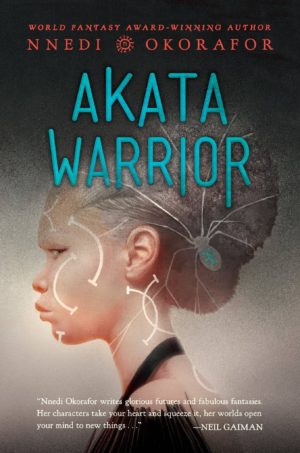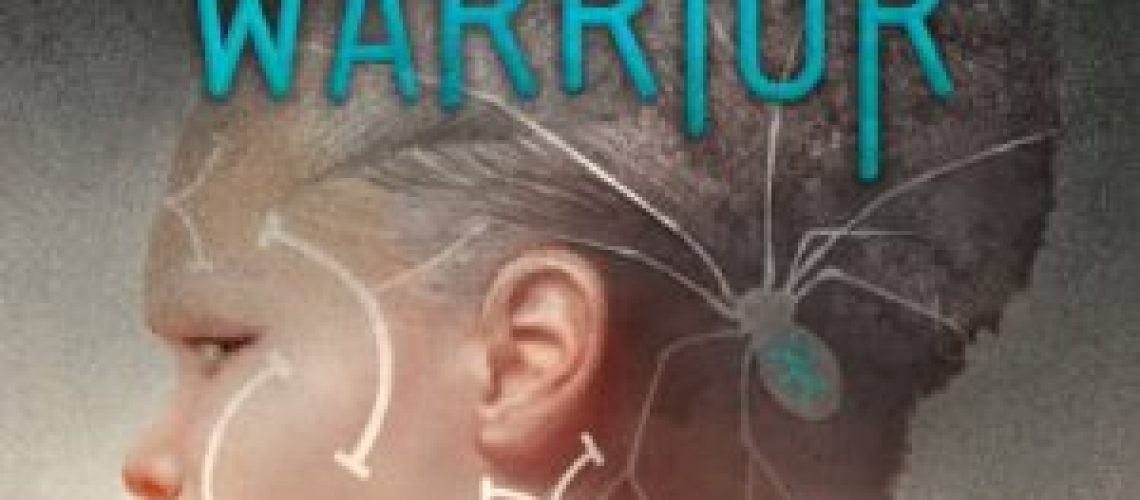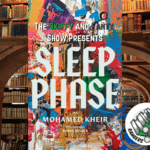Keen fans of the Hugo Awards will be aware that 2018 marks the inaugural presentation of the World Science Fiction Society Award for Best Young Adult Book. The shortlist for this Hugo-adjacent award (which will, barring shenanigans at the AGM, henceforth be known as the Lodestar Award) includes Akata Warrior by Nnedi Okorafor.
This is the second book in Okorafor’s series, Akata Witch. It tells the story of Sunny Nwazue, a teenage girl born in New York City whose Nigerian parents have brought her across the Atlantic to live in their hometown. Sunny is a Leopard Person, someone with an affinity for juju and thus able to work magic. In Akata Warrior, she develops these abilities under the strict guidance of her mentor Sugar Cream and the tried and true method of getting into mischief with her friends. However, it’s not all fun and games. Ekwensu, the masquerade responsible for murdering Sunny’s grandmother (and also the only other Leopard Person in Sunny’s family) is still on the loose. Sunny and her friends must track down the masquerade before Ekwensu brings about the apocalypse.

In the interest of transparency, I haven’t read the first book in the series. So, I was pleased that Akata Warrior contains a recap of the previous book. It also contains important information, such as what juju is and the meaning of akata. As a general rule, I’m not fond of info-dumping. However, this was not only useful but presented in a way that really set the tone for the rest of the story. This introduction came in the guise of a briefing letter about Sunny from the Leopard People library to which her mentor belongs. Although not directly signed by Sugar Cream, it has the same no-nonsense voice and impatience for foolishness. While it’s made out to be an official document, it’s couched in story-telling cadences. This not only indicates a non-Western culture, but makes for an engaging way of delivering this necessary information.
It’s tempting to frame the story as Nigerian Harry Potter and there are some similarities. Sunny is a powerful magic user, aided by a small group of close friends. She has been brought up by Lambs—the equivalent of Muggles. It is her duty to prevent a dark entity, who is weak to begin with, from killing her and destroying the world. However, Sunny has more to overcome than Harry did. Where Harry was free to leave behind the ordinary world for the wonders of Hogwarts, Sunny remains enmeshed in her family. Which is a problem since, like wizards, Leopard People function as a kind of secret society whose business must be kept hidden from the Lambs. Sunny’s studies and misadventures cause her to come and go at odd hours, and while she’s adept at lying and sneaking around, her parents aren’t completely stupid. I found the presence of Sunny’s parents refreshing and I thought a good balance was struck between their concern for their daughter and their desire to turn a blind eye to what they don’t understand.
While negotiating between magic and non-magic realms, Sunny also must learn to bridge cultures. Being born and raised in the United States, she’s something of an outsider in Nigeria. Mostly this manifests in small ways—like not knowing how to cook a culturally important dish—but still crucial to a sense of belonging. This is further exacerbated by her albinoism, which often makes her an object of revulsion to superstitious Lambs. And she finds herself occasionally stymied by the sexism around her. Her father in particular has different standards for how Sunny should behave compared to her older brothers. This is not a strong part of the story, but it does contribute to the sense of alienation Sunny feels as she tries to adjust to living somewhere so far from where she was brought up.
Interestingly, her friends both hinder and help with this. Sunny is part of a close-knit group of four. Although they are quick to support Sunny throughout her adventures, they’re not immune to internal division. Sunny’s best friend Chichi insists on flirting with Sunny’s oldest brother, despite being in a tentative relationship with Sasha, another of their friends. This puts Sunny in an awkward position when arguments break out between Chichi and Sasha as well as Sasha and Chukwu. However, I appreciated the way the two rivals for Chichi’s affection also bond over favourite music and the various macho stunts they pull, giving some nuance to their relationship (and making their conflict feel that much worse).
The fourth member of the group is Orlu, the sweet boy next door who Sunny is sort-of dating. One of the things I loved most about Orlu is that he’s both dyslexic and the most studious of the group. All too often, the former is assumed to preclude the latter. Instead, Orlu is constantly researching things of interest and has a particular fascination for magical creatures. Despite being a generally kind and considerate person, he manages to put a dampener on his relationship with Sunny by introducing her to his aunt, a Lamb who immediately accuses Sunny of being a child witch. While Sunny is a magic user, hers is a traditionally West African magic. In contrast, child witches operate in a Christian paradigm. Indications suggest child witches don’t exist as actual magic users in the world of Akata Warrior; however, it remains an extremely dangerous accusation to Sunny. And a traumatic one, particularly as it comes on the basis of her appearance and has nothing to do with her ability to use juju.
As may be clear, the story is juggling a lot of elements. I found it a little slow to start, suiting the focus on Sunny’s personal journey over the more high-stakes adventure that develops as the story progresses. However, even the latter stages of the story are more about Sunny’s growth. The big villain gets very little page time and I found this made it difficult for me to feel any real sense of threat… although this could also be one of the problems with not having read the first book.
Quibbles aside, Akata Warrior is well-grounded in the conventions of YA, while at the same time bringing a fresh approach. It certainly deserves to be shortlisted for the inaugural Lodestar Award.







